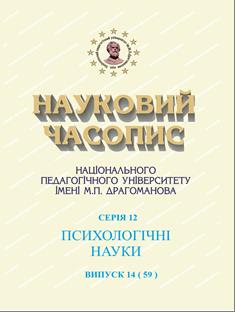THE ROLE OF THE VALUE AND MOTIVATIONAL SPHERE OF PERSONALITY IN THE PROCESS OF ADAPTATION OF UKRAINIAN WINTERERS TO LIFE IN THE CONDITIONS OF ANTARCTICA
DOI:
https://doi.org/10.31392/NPU-nc.series12.2021.14(59).07Keywords:
adaptation, adaptability, personality values, groups of high, medium and low adaptability, distribution of sampling into groups, personality, life, value-motivational sphereAbstract
The article focuses on the study of the role of the value and motivational sphere of the personality of Ukrainian winterers in the process of adaptation to life at the Ukrainian Antarctic station “Academician Vernadsky”. The actuality of the research chosen is based on the fact that Ukraine is one of 19 countries in the world with permanent Antarctic stations. The participants of Ukrainian Antarctic Expeditions fulfill scientific research on such branches of sciences as biology, hydrometeorology, geophysics, geology, engineering, psychology, psychophysiology. Winterers have to work in extreme conditions dealing with exposure to low temperatures, jet lag and light zones, sensory deprivation, psychological characteristics of work and rest in a limited team. The purpose of this article is the theoretical substantiation and empirical proof of the role of the value and motivational sphere of personality in the process of adapting Ukrainian winterers to life in the conditions of Antarctica. The scientific studies of domestic and foreign researchers who deal with the problem of adaptation to life in extreme conditions are analyzed. The concept of adaptation and adaptability to extreme conditions is specified. Methodological tools of research are approved and described. An empirical study on separating the groups of high, medium and low adaptability to vital activity in the extreme conditions of Antarctica is conducted. The criteria for allocating the groups of different levels of adaptability are determined: the number of winterers, sociometric rating, the presence of personality qualities that are essential for life in extreme conditions. The role of value and motivational sphere among the representatives of each group is determined.
It is proved that the winterers who have a high level of adaptability to a greater extent have professional values; the winterers who have an average and low level of adaptability have cognitive values; in addition to this the winterers who have a low level of adaptability to a large extent have material values.
References
- Gordeev, A.D. (2016). Rozrobka informatsiynoyi tekhnolohiyi protsesu profesiynoho vidboru operatoriv ekstremalnykh vydiv diyalnosti [Development of information technology of the process of professional selection of operators of extreme activities]. Tekhnolohichnyy audyt ta rezervy vyrobnytstva – Technological audit and production reserves, 5/1(31), 11–16 [in Ukrainian].
- Danilenko, N.V. (2019). Teoriya instynktiv V.I. Harbuzova yak resurs osobystosti [Theory of instincts V.I. Gorbuzkov as a person’s life]. Proceedings from KhAMP’ 19: Materialy III mizhrehion. nauk.-prakt. konf. (kataloh psykhotekhnolohiy; tezy dop.) “Kharkivskyy osinniy marafon psykhotekhnolohiy” – Materials III interregion. scientific-practical conf. (catalog of psychotechnologies; thesis add.) “Kharkiv Autumn Marathon Psychotechnologіes” (Kharkiv, October 26, 2019), (pp. 99-102). Kharkiv : Disa Plus [in Ukrainian].
- Larsen, E.B. (2016). Na predele. Nedelya bez zhalosti k sebe [On Preved. Needlessly without tolerate to himself]. Moscow : Mann, Ivanov and Ferber [in Russian].
- Maklakov, A.G. (2017). Obshchaya psikhologiya: uchebnoye posobiye dlya studentov vuzov i slushateley kursov psikhologicheskikh distsiplin [General psychology: a textbook for university students and students of courses in psychological disciplines]. Saint Petersburg : Piter [in Russian].
- Miroshnychenko, O.A. (2016). Rol temperamenta zimovshchika v protsesse adaptatsii k usloviiam zhiznedeiatelnosti v Antarktike [The role of the temperament of the winterer in the process of adaptation to the conditions of life in the Antarctic]. Nauka i osvita. Psykholohiya: nauk.-prakt. zhurnal – Science and Education. Psychology: Scientific and Practical Journal. 7/CXXKHVIII, 126–132 [in Russian].
- Miroshnychenko,O.A., Hutsuliak, O.P., & Marchenko, O.V. (2018). Vprovadzhennya diahnostychnykh protsedur i treninhovykh prohram u psykholohichnu pidhotovku ta reabilitatsiyu zymivnykiv [Implementation of diagnostic procedures and training programs in the psychological preparation and rehabilitation of wintering grounds]. Ukrayinskyy antarktychnyy zhurnal – Ukrainian Antarctic Journal, 16, 178–187 [in Ukrainian].
- Miroshnichenko, O.A., & Pasichnyk, I.D. (2020). Hotovnist ukrayinskykh zymivnykiv do zhyttyediyalnosti na antarktychniy stantsiyi [The readiness of Ukrainian winterers to life in an Antarctic station]. Naukovyy chasopys NPU imeni M.P. Drahomanova. Seriya 12. Psykholohichni nauky – Scientific Journal of National Pedagogical Dragomanov University. Series 12. Psychological Sciences, 10(55), 58–67 [in Ukrainian].
- Moiseyenko, Ye.V., Miroshnychenko, O.A., Madyar, S.A., Rozova, K.V., Kuzovyk, V.D., Kovalevska, O.E., et al. (2019). Tekhnolohiyi diahnostyky i prohnozu psykhofiziolohichnoho statusu dlya vidboru fakhivtsiv do roboty v ekstremalnykh umovakh (metodychni rekomendatsiyi) [Technologies for diagnosis and prognosis of psychophysiological status for the selection of specialists to work in extreme conditions (guidelines)]. Kyiv : NTR “Antarktyka” [in Ukrainian].
- Nalchadzhian, A.A. (2010). Psikhologicheskaya adaptatsiya: mekhanizmy i strategii [Psychological Adaptation: Mechanisms and Strategies]. Moscow : Eksmo [in Russian].
- Pyshnov, G.Yu. (2011). Pidkhody do otsinky stupenya vyhoryannya u osib z napruzhenoyu pratseyu za dopomohoyu lohistychnykh modeley [Approaches to assess the degree of burnout in individuals with tense work with the help of logistic models]. Ukrayinskyy medychnyy chasopys– Ukrainian medical magazine, 3, 101–105 [in Ukrainian].
- Rajgorodskij, D.Ja. (2008). Prakticheskaya diagnostika. Metodiki i testy: ucheb. Posobiye [Practical diagnostics. Procedures and tests]. Samara : “BAHRAH-M” [in Russian].
- Sidorenko, E.V. (2007). Metody matematicheskoy obrabotki v psikhologii [Methods of mathematical care in psychology]. Saint Petersburg : Rech [in Russian].
- Fress, P., & Piaget, J. (1975). Eksperimentalnaya psikhologiya [Experimental psychology]. Moscow : Progress [in Russian].
- Bakhmutova, L. (2019). Factors and models of interpersonal interaction of participants in long-term Ukrainian Antarctic Expeditions. Fundamental and applied researches in practice of leading scientific schools, 36(6), 48–55.
- Mehta, M., & Chugh, G. (2011). Achievement Motivation and Adjustment in Members of Indian Scientific Expedition to Antarctica. Psychological Studies, 56(4), 404–409. https://doi.org/10.1007/s12646-011-0109-7
- Moiseyenko, E., Sukhorukov, V., Pyshnov, G., Mankovska, I., Rozova, K., Miroshnichenko, O. et al. (2016). Antarctica challenges the new horizons in predictive, preventive, personalized medicine: preliminary results and attractive hypothesis for multidisciplinary prospective studies in the Ukrainian “Akademik Vernadsky” station. EPMA Journal, 7(1), 11. https://doi.org/10.1186/s13167-016-0060-8

